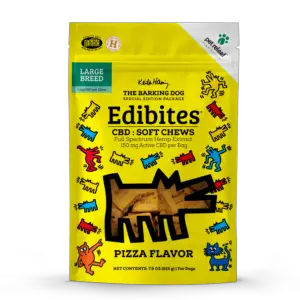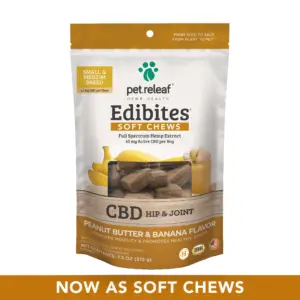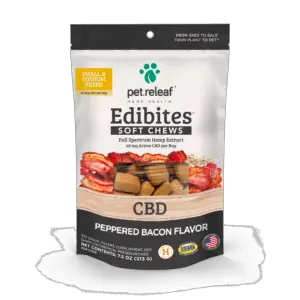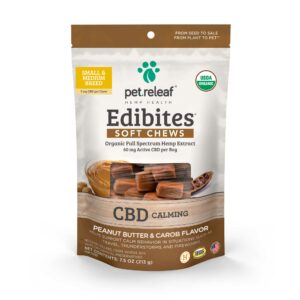
Key points
- Puppies acquire more than half of their adult brain mass during the first month of life. Thus, it is vital to supplement their diet with DHA, an essential structural component of the brain;
- You should include products rich in antioxidants in your elderly dog’s diet to prevent cognitive dysfunction. These include spinach, blueberries, and sweet potatoes;
- To keep your pup’s brain working properly, feed the pet a well-formulated diet that contains enough protein, fats, carbohydrates, fiber, vitamins, minerals, and water.
Do you still doubt that food can affect our behavior? Then you should try to recall the last time you ate a big meal. It’s almost certain that you felt extremely tired after consuming it. You can also recall how giving your child a sweet treat can instantly make it hyperactive. However, food doesn’t just influence our brain function and behavior, it also affects our dogs.
Feeding canines with species-appropriate food made from natural ingredients is not only important for their physical health but also for their behavior, i.e., their psyche. A dog that feels good all-around has a balanced mind. Moreover, some scientists now believe that it’s possible to alter certain neurological and physical features of a canine’s brain by changing its diet.
Table of Contents
Puppy Brain Development
A study conducted by a team of researchers and behavioral scientists at the University of Toronto has examined the importance of proper nutrition in the brain function and behavior of dogs. According to the study, a puppy’s brain develops at a blistering pace during the first month of life. Then this pace slows down until the puppy reaches adulthood. In the study, puppies that ate food enriched with Omega-3 fatty acids showed better learning ability and ERG-assessed retinal function than the control group.
Dogs fed with fish oil rich in DHA, also known as docosahexaenoic acid (a structural component of the brain), responded to training faster than others. Their cognitive development was also superior.
According to Dr. Stanley Coren, a professor of psychology at the University of British Columbia, balanced nutrition is vital for puppies up to one year old. He says that proper feeding enables the development of mature brain cells in dogs. Conversely, if a pup is not fed a proper diet, its brain might get smaller in volume and weight and, thus, not function properly. Malnutrition is also associated with diminished cognitive functions in dogs throughout their entire lives.
To some extent, a dog’s brain and behavior are shaped while it develops in the womb. For example, at the age of ten days, puppies already have a few hundred neural connections (synapses) that a single cell in the cortex has built with other cells in the brain. After a month, the number of new connections reaches 12,000! Thus, in just a couple of weeks, a puppy develops thousands of neural connections that play a crucial role in brain activity.
Typically, pet owners don’t have any influence over the nutrition of their dogs’ parents. We also usually can’t control our pets’ nutrition during the first 2 months of their lives, unless, of course, the puppies’ mother also lives in our home. However, the diet your furry friend is fed in its childhood is incredibly important.
The Danger of Poor Quality Dog Diets
Unfortunately, many commercial diets for dogs are not adequately formulated, as they do not contain enough protein, fats, vitamins, and minerals. At the same time, they contain questionable ingredients that can have an adverse effect on our furry friends’ health. These include slaughterhouse waste, toxic products from spoiled foodstuffs, non-nutritional fillers, heavy metal contaminants, sugar, pesticides and herbicides, drug residue, artificial colors, flavors, and preservatives, bacterial and fungal contaminants. According to Andi Brown, director of Halo and author of The Whole Pet Diet, synthetic ingredients are a real danger for pets since they can have a hallucinogenic effect on them. Consequently, animals can get put down by vets or turned into shelters due to their bad behavior. However, very often, it is owners who make their pets behave this way by feeding them an inappropriate diet.
If you suspect that your dog’s behavioral problems might be caused by malnutrition, you should consider adding some minerals and vitamins, especially the full complex of B vitamins, to its diet. However, it’s best to consult a vet before doing this.
How to Choose The Right Diet For a Dog?
Protein, fats, carbohydrates, fiber, vitamins, minerals, and water are essential nutrients in pet food. There are a few rules you have to follow in choosing a healthy and balanced diet for your dog:
- Select only premium brands that take into account the various nutritional requirements of each breed and species.
- Pay attention to whether the food is marked as complete or supplementary. Complete foods contain everything your puppy needs for healthy development.
Insect-Based Dog Food
Dog food suitable for growing puppies is usually characterized by its high energy content, mineral content adapted to the needs of young puppies, and high-quality, easily digestible protein. One example of high-quality dog food suitable for both young and adult dogs is insect-based pet food manufactured by PetCan. Our food will not only provide your puppy with all the premium protein it needs but also supply your puppy with other vital ingredients such as Omega-3, Omega-6, and essential fatty acids. In addition, it is well-tolerated by pets and suitable for those with sensitive tummies since insect-based food is hypoallergenic. In addition to being good for your dog, insect-based dog kibble is also sustainable and good for the Earth.
Breed-Appropriate Dog Food
It makes sense to buy puppy food adapted to the dog breed’s size, as small breeds of dogs grow differently than large ones. For example, at the end of the first year of its life, a Dachshund weighs around 25 times as much as on the day it was born, while a Great Dane increases its weight 100 times over the same period and will continue to grow for another year until it reaches its final size.
Hydration

Your four-legged friend should always have enough fresh water at its disposal. Remember to fill its bowl with fresh water every day and clean it regularly. Your dog should have access to plenty of water all year long, not just in summer. If your dog eats wet or fresh food, it will drink less than pets that eat dry kibble. If your dog doesn’t drink enough water, you can give it some meat juice to make it drink more.
Brain Food For Dogs
You can also supplement your dog’s diet with some products that will help keep its brain sharp and healthy. However, keep in mind that many of these foods are not suitable for feeding regularly.
Spinach and blueberries
Spinach and blueberries are excellent sources of antioxidants for your dog. When your pet ages, its brain could become affected by the CDS syndrome, which is very similar to Alzheimer’s in humans. You can help your dog restore its cognitive function and keep its brain active and healthy by feeding it spinach and blueberries.
Fish and fish oil
As mentioned above, fish is very rich in Omega-3 fatty acids, which makes it a perfect superfood for dogs. Moreover, this product can help your pet fight inflammation, relieve arthritis pain, and alleviate the symptoms of heart disease.
Fish (salmon, sardines, and tuna) is an excellent source of DHA for your puppy. Since puppies’ bodies can produce only a limited amount of DHA, they need to get enough of this nutrient from food to develop enough brain mass. Remember that fatty acids are also found in flaxseed, wheat germ, canola, and soybean oils.
Sweet potatoes
Sweet potatoes are high in carbohydrates, fiber, potassium, vitamins A, B6, C, and calcium. These nutrients can positively affect your dog’s nervous and immune systems. Just like spinach and blueberries, sweet potatoes are also full of antioxidants. This vegetable will give your pup an energy boost and help improve its neurological health.
Coconut Oil
Coconut oil has been scientifically proven to help old people and animals suffering from cognitive dysfunction. Moreover, this product can improve the quality of your dog’s skin, coat, and digestive system.
Keep in mind that overfeeding your dog with coconut oil can result in digestive distress or weight gain.
Dog Brain Supplements
A study conducted by behavioral neurologist Dr. Norton Milgram and neurochemist Dr. Carl Cotman compared human aging to canine aging. Scientists found out that the pathological changes in the brains of elderly pets and humans are identical, with oxidative damage being a key feature. Thus, Dr. Cotman suggests using antioxidant supplements such as vitamins E and C to improve cognitive decline in mammals. Other nutrients that can be beneficial for brain health include beta carotene, selenium, DHA and EPA fatty acids, carnitine, and alpha-lipoic acid. They have been shown to minimize neurological problems in dogs and to help them with amyloids (a disease that prevents body organs from working properly). These supplements are also associated with cognitive enrichment.
FAQ
How do you strengthen a dog’s brain?
Omega-3 fatty acids can help strengthen a dog’s brain. Thus, you should consider supplementing your dog’s diet with products rich in Omega-3, for example, salmon, sardines, and tuna.
What foods are good for dogs’ brains?
Feed your dog a complete and balanced diet throughout its whole life to keep its brain working properly. In addition, products such as fish, coconut oil, spinach, and sweet potatoes, are also very beneficial for the neurological health of your puppy.







